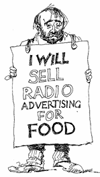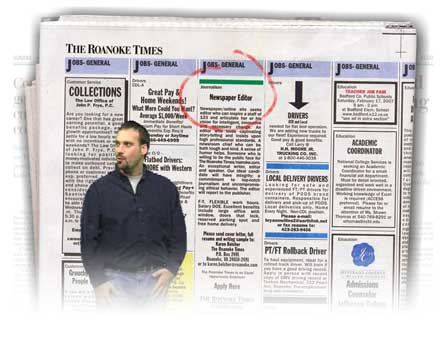“Facing increasing competition from satellite radio and iPods, Clear Channel Communications is trying something radically different at a commercial radio station in Texas: getting rid of the commercials.
As of today, KZPS in Dallas — on the dial at 92.5 FM or online at lonestar925.com — will no longer run traditional 30- or 60-second advertisements. Instead, advertisers sponsor an hour of programming, during which a D.J. will promote its product conversationally in what the company calls integration.” — New York Times
Tag Archives: advertising
Google will sell ads on Clear Channel
Google has broken into radio with a multi-year advertising sales agreement with the largest U.S. broadcaster, Clear Channel Radio. Clear Channel said it has agreed for Google to sell a guaranteed portion of the 30-second spots available on its 675 radio stations in top U.S. markets, in a bid to expand the universe of local radio advertisers to Google’s online buyers.
A Clear Channel executive said Google has access to less than 5% of the radio broadcaster’s overall inventory of advertising air time. The U.S. radio industry generates $20 billion in annual sales. [USAToday]
Internet ad spending to overtake radio next year
That would be a year earlier than originally forecast. Mark Ramsey asks, “How much of your business plan is aimed at driving your audience to – and deriving revenue from – the Internet?
Uh, can I get back to you on that?
Google Audio looking better to radio groups
“Google is finding some friends. There are plenty of critics of Google’s foray into radio — but we’re slowly seeing some group heads come out and say there may be a place for the Internet giant in radio sales. Regent tested the service in two markets and CEO Bill Stakelin says they sold “a tremendous amount of inventory” and the results “far exceeded our expectations.” He says the issue that remains to be worked out is pricing.
While Emmis CEO Jeff Smulyan says “if Google has the advertiser that we’re never going to call on at rates that make sense … then it’s business that we want to take.” Smulyan says Google’s efforts are especially welcome in “transactional” markets like New York and L.A. where radio has done a “marginal job” at attracting new advertisers.
Meanwhile — Border Media Partners CEO Tom Castro says many folks are focusing on HD and streaming. But the real technological breakthrough will come on the sales side. Castro says “it’s not very sexy — but it’s where we are going to make a lot of money in the future.” — INSIDE RADIO report from the Kagan Radio-TV Summit:
March Madness stats, YouTube deal
“As of 4 p.m. on the first day of the NCAA tournament, CBS Sportsline said it had logged 1.5 million visits and 800,000 registrations to March Madness on Demand, the site’s free live video service. Just before the tip off of the Maryland-Davidson game, 189,000 users were waiting in line to watch the game live. Impressive. Meanwhile, CBS cut another deal with YouTube, this time to stream March Madness highlights on the site. The section is sponsored by Pontiac, which is also sponsoring coverage on the air.” — Lost Remote
Google Audio Ads by the numbers
Mark Ramsey (Hear 2.0) offers still more insight on Google Audio Ads, including some screenshots of pages where you specify the demographic and geographic details of your buy. For businesses that don’t need an “advertising consultant” to show up with a media kit and a coverage map, this might be an effective way to buy radio ads.
Write for your audience
 I’m a big fan of the Keith and the Girl podcast. If you have never listened you can skip this post because it probably won’t make any sense. Keith is a sort-of stand-up comic who shoots the shit with his girlfriend, Chemda, for an hour every day. Explicit content. Not for sissies. I love the show.
I’m a big fan of the Keith and the Girl podcast. If you have never listened you can skip this post because it probably won’t make any sense. Keith is a sort-of stand-up comic who shoots the shit with his girlfriend, Chemda, for an hour every day. Explicit content. Not for sissies. I love the show.
I finally got around to visiting the “Support” page on their website and discovered some very effective ad copy. For example:
“Blockbuster gives you sissy cuts of movies and claims you didn’t return your film. Netflix gives you the dirtiest version available and gives you the benefit of the doubt. Blockbuster doesn’t believe the holocaust happened. Netflix has all the holocaust movies. Netflix has never let us down. Blockbuster raped my grandmother. (You can rent those tapes through Netflix.)”
I would be very surprised if Keith did not write this copy. Clearly his style. This copy is effective because it is –in the context of their podcast– real. This is the way Keith and Chemda talk. This is what their listeners expect from them. Attitude.
I’m not sure some ad agency wonk could write this. And if they tried, it somehow would not sound legit. And I’ll bet you a hot oil back rub that Keith and Chemda insist on writing the copy. They get that Madison Avenue bullshit would not work on their site.
Google Audio will raise ad rates
 That’s the prediction of Google Audio national director of sales Drew Hilles tells Inside Radio “Our main goal is to draw new advertisers to radio” and when they do that’ll put pressure on inventory and result in higher rates for all buyers. The onetime CBS Radio exec says “our goal is to raise rates” and return the sector to double-digit growth. He says one way they help preserve a station’s rate card integrity is by allowing buyers to pick markets — but not individual stations. And Hilles says “stations have control of the throttle of how much of the inventory they open up or not.” Hilles says Google is working to attract some of its existing 100,000 advertisers who have found radio too tough to buy. Hilles says what attracts them is the “more Googley way” they sell radio that affords buyers more accountability and trackability. Google says “a large amount” of the advertisers are new to radio. [INISIDE RADIO]
That’s the prediction of Google Audio national director of sales Drew Hilles tells Inside Radio “Our main goal is to draw new advertisers to radio” and when they do that’ll put pressure on inventory and result in higher rates for all buyers. The onetime CBS Radio exec says “our goal is to raise rates” and return the sector to double-digit growth. He says one way they help preserve a station’s rate card integrity is by allowing buyers to pick markets — but not individual stations. And Hilles says “stations have control of the throttle of how much of the inventory they open up or not.” Hilles says Google is working to attract some of its existing 100,000 advertisers who have found radio too tough to buy. Hilles says what attracts them is the “more Googley way” they sell radio that affords buyers more accountability and trackability. Google says “a large amount” of the advertisers are new to radio. [INISIDE RADIO]
Most creative media job posting ever

Lost Remote points us to this very clever and effective job posting (for an editor) at The Roanoke Times.
Now, compare that to the job listings at your company. Or my company. Can we do more creative ads? Absolutely. But nobody has ever asked for one. Would we get better candidates with postings like this? Maybe.
Adding interesting ads to mediocre products
Couple of bullets from a podcast with Seth Godin, during which he talks about ad agencies;
“What ad agencies ought to do, in my opinion, is not focus on selling ads anymore. And instead, focus on getting in deeper within the clients, and help the clients make products that people want to talk about.”
“The problem is that ad agencies have defined themselves as the people who take the mediocre products and add interesting ads to them, and washed their hands and say, we can’t do anything about what the factory brings us. And my answer is, of course you can, and the clients actually want you to, you’re just not working hard enough to get that piece of business.”
[via Learfield InterAction]
